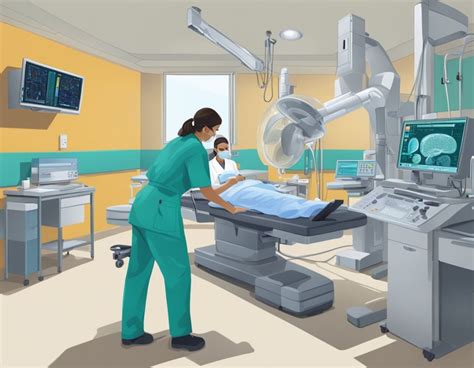Are you considering a career in the medical field, but unsure whether to become a radiology technologist or a nurse? Both careers are essential to the healthcare system, but they have different responsibilities, requirements, and challenges. In this article, we'll explore the key differences between radiology tech and nursing careers, including their educational requirements, job duties, and work environments. We'll also discuss which career is harder, based on various factors such as physical demands, emotional stress, and patient interaction.
What is a Radiology Technologist?
A radiology technologist, also known as a radiologic technologist, is a medical professional who uses imaging technologies such as X-rays, CT scans, and MRI machines to produce images of the body's internal structures. These images help doctors diagnose and treat medical conditions. Radiology technologists work in hospitals, clinics, and imaging centers, and may specialize in areas such as mammography, ultrasound, or computed tomography (CT).

Responsibilities of a Radiology Technologist
Radiology technologists are responsible for:
- Preparing patients for imaging procedures
- Operating imaging equipment such as X-ray machines and CT scanners
- Positioning patients correctly to capture high-quality images
- Maintaining patient records and imaging data
- Working with radiologists to interpret images and make diagnoses
What is a Nurse?
A nurse is a healthcare professional who provides hands-on care to patients, including administering medications, monitoring vital signs, and performing medical procedures. Nurses work in hospitals, clinics, nursing homes, and community health organizations, and may specialize in areas such as pediatrics, oncology, or critical care.

Responsibilities of a Nurse
Nurses are responsible for:
- Assessing patients' physical and emotional needs
- Developing and implementing care plans
- Administering medications and treatments
- Monitoring patients' progress and adjusting care plans as needed
- Educating patients and families about healthy habits and medical conditions
Education and Training Requirements
Radiology technologists typically earn an associate's degree in radiologic technology, which takes two years to complete. They must also pass a certification exam to become registered technologists. Nurses, on the other hand, may earn an associate's degree in nursing (ADN) or a bachelor's degree in nursing (BSN). ADN programs take two years to complete, while BSN programs take four years.
Comparison of Education and Training Requirements
| Career | Education | Training |
|---|---|---|
| Radiology Technologist | Associate's degree | Certification exam |
| Nurse | Associate's degree or Bachelor's degree | Licensure exam |
Work Environment and Physical Demands
Radiology technologists typically work in hospitals, clinics, and imaging centers, where they are exposed to radiation and may be required to lift heavy equipment. Nurses work in a variety of settings, including hospitals, clinics, and nursing homes, where they may be exposed to infectious diseases and must lift and move patients.

Comparison of Work Environment and Physical Demands
| Career | Work Environment | Physical Demands |
|---|---|---|
| Radiology Technologist | Hospitals, clinics, imaging centers | Radiation exposure, lifting heavy equipment |
| Nurse | Hospitals, clinics, nursing homes | Lifting and moving patients, exposure to infectious diseases |
Emotional Stress and Patient Interaction
Both radiology technologists and nurses interact with patients, but nurses tend to have more intense emotional interactions, as they provide hands-on care and support to patients and families. Radiology technologists, on the other hand, may have less emotional interaction with patients, but may still experience stress due to the pressure to produce high-quality images and work with radiation.

Comparison of Emotional Stress and Patient Interaction
| Career | Emotional Stress | Patient Interaction |
|---|---|---|
| Radiology Technologist | Moderate stress due to radiation exposure and pressure to produce high-quality images | Limited emotional interaction with patients |
| Nurse | High stress due to intense emotional interactions with patients and families | High level of patient interaction and emotional support |
Which Career is Harder?
Based on the factors discussed above, nursing is generally considered a harder career than radiology technology. Nurses have more intense emotional interactions with patients and families, and are exposed to infectious diseases and physical demands such as lifting and moving patients. Radiology technologists, on the other hand, have more limited emotional interaction with patients, but may still experience stress due to radiation exposure and pressure to produce high-quality images.





What is the difference between a radiology technologist and a nurse?
+A radiology technologist uses imaging technologies to produce images of the body's internal structures, while a nurse provides hands-on care to patients, including administering medications and monitoring vital signs.
Which career is harder, radiology technology or nursing?
+Nursing is generally considered a harder career than radiology technology, due to the intense emotional interactions with patients and families, and the physical demands of lifting and moving patients.
What are the educational requirements for radiology technologists and nurses?
+Radiology technologists typically earn an associate's degree in radiologic technology, while nurses may earn an associate's degree in nursing (ADN) or a bachelor's degree in nursing (BSN).
In conclusion, while both radiology technology and nursing are essential careers in the medical field, they have different responsibilities, requirements, and challenges. Nursing is generally considered a harder career due to the intense emotional interactions with patients and families, and the physical demands of lifting and moving patients. If you're considering a career in the medical field, it's essential to research and understand the requirements and challenges of each career to make an informed decision.
